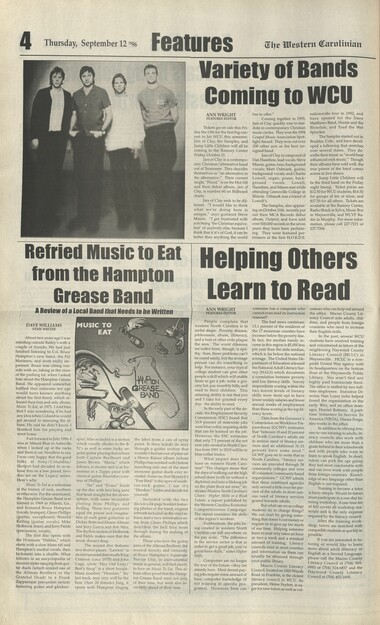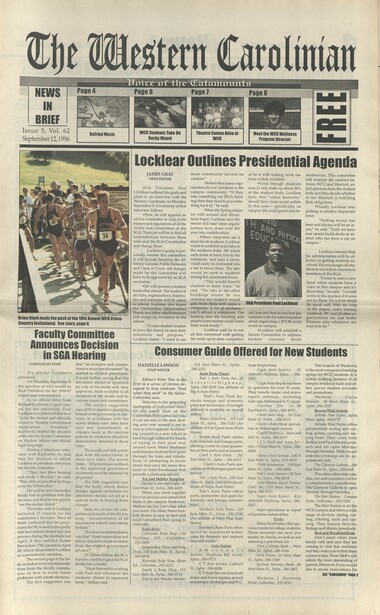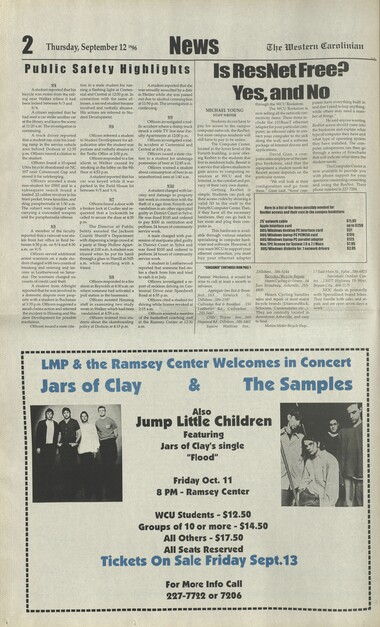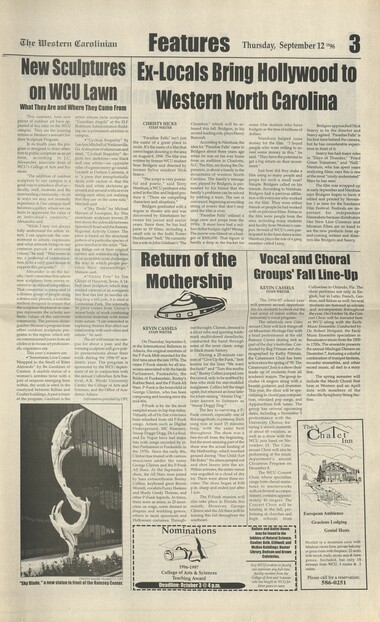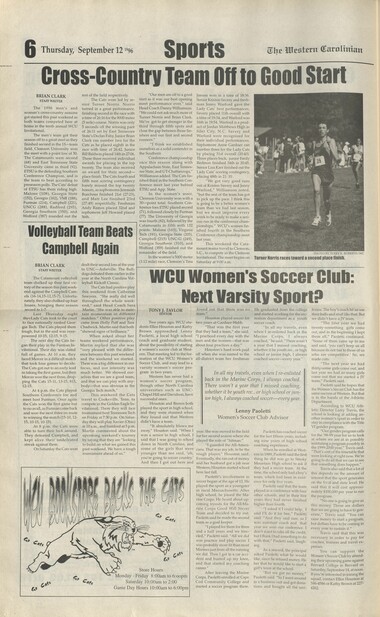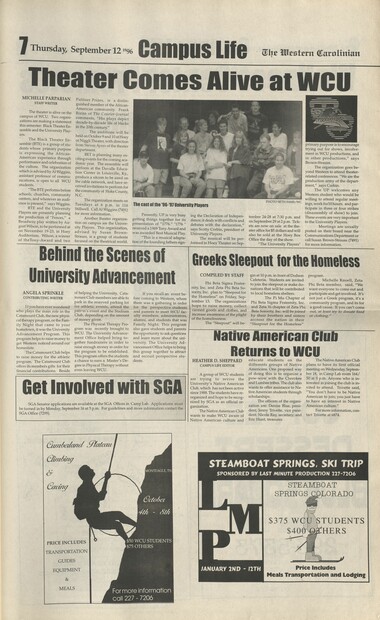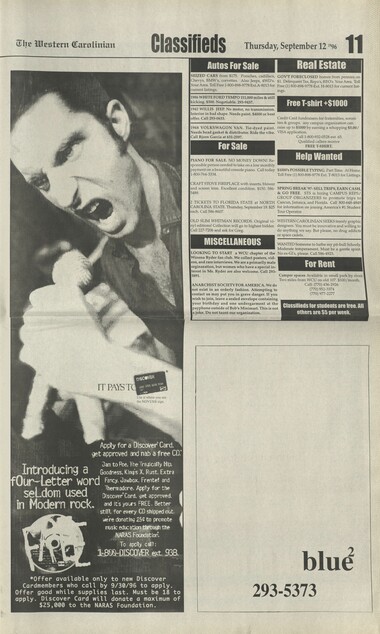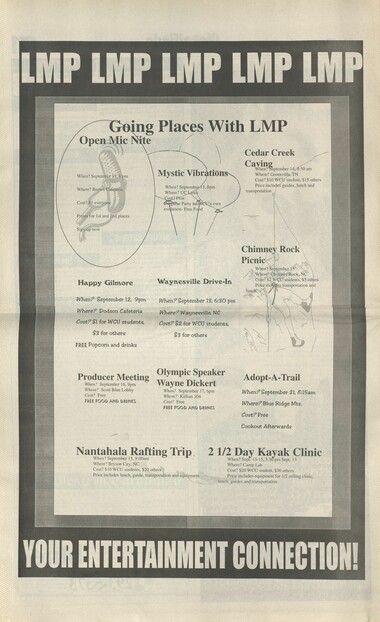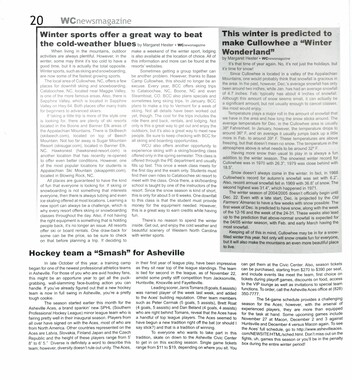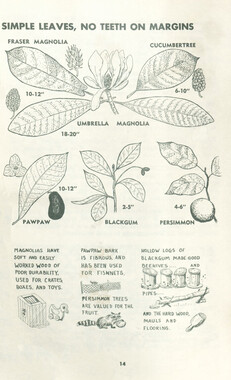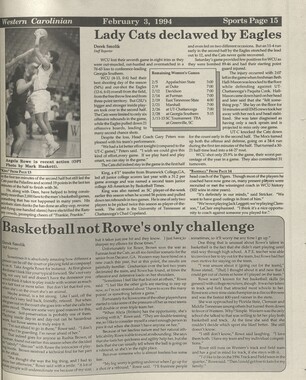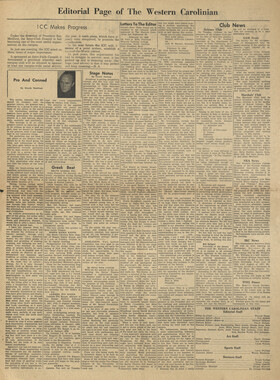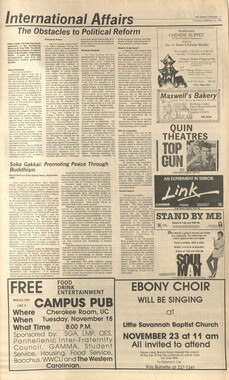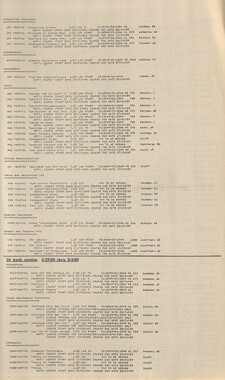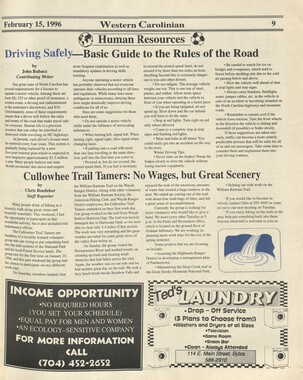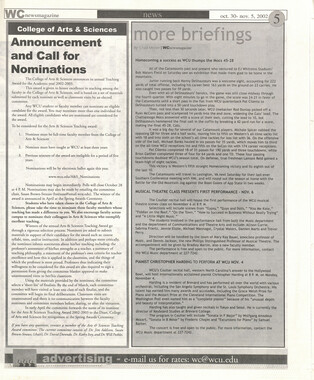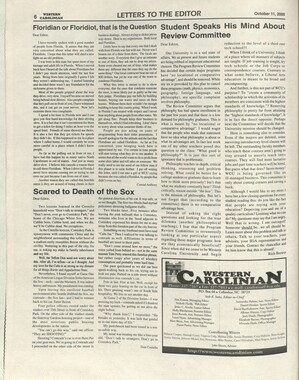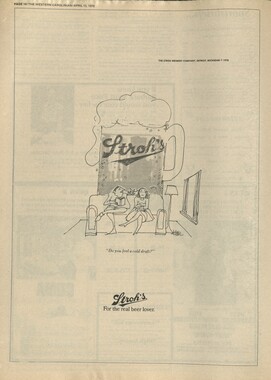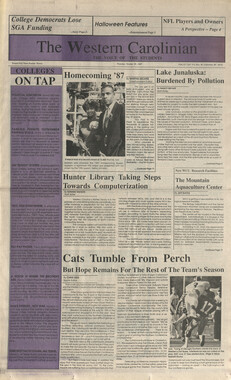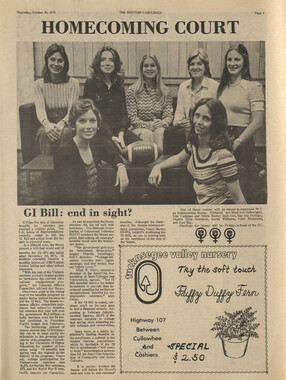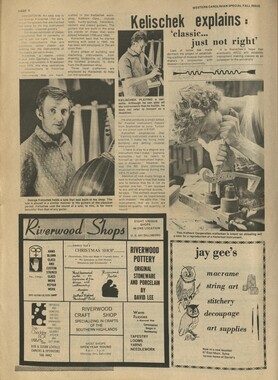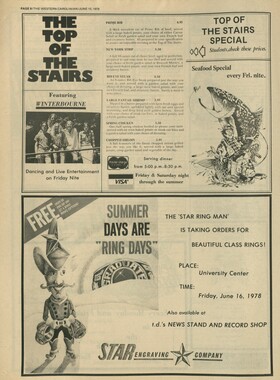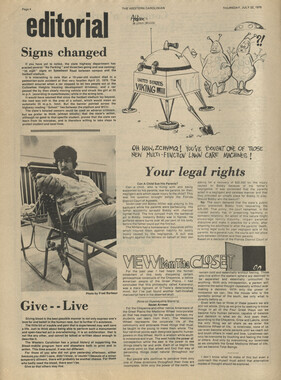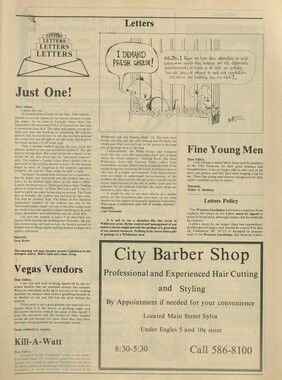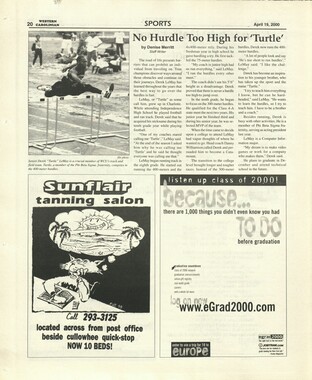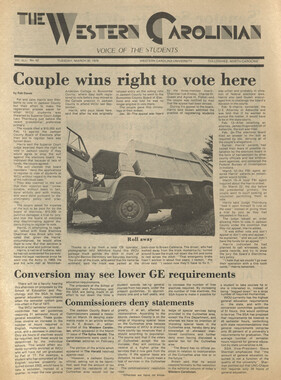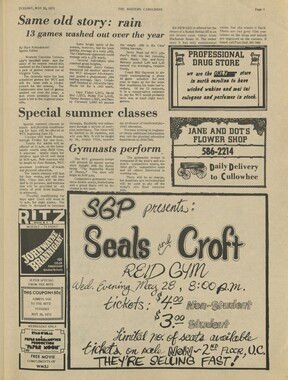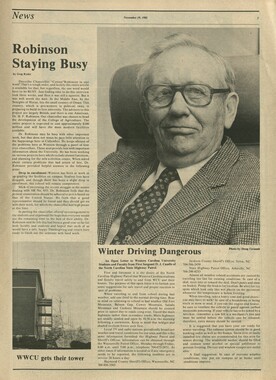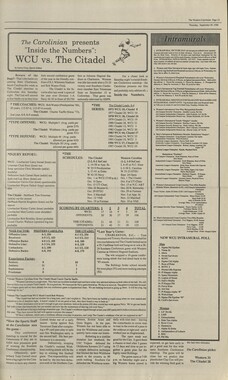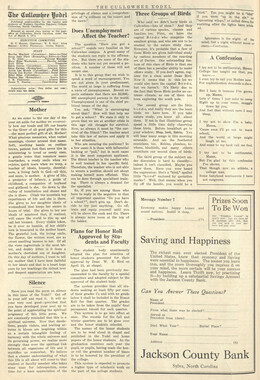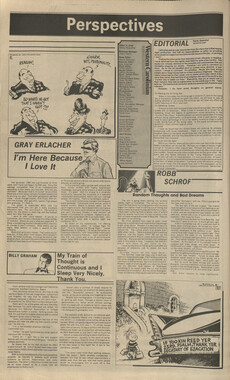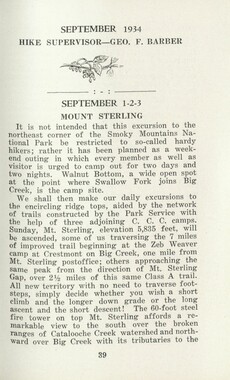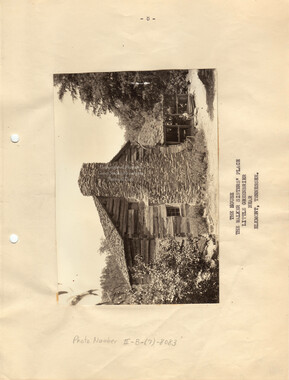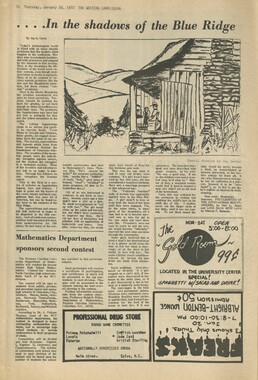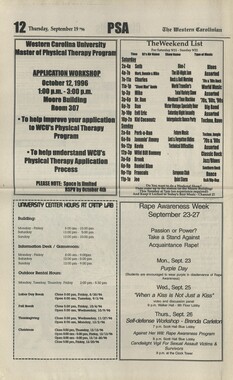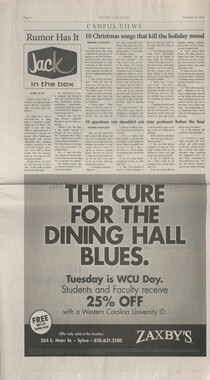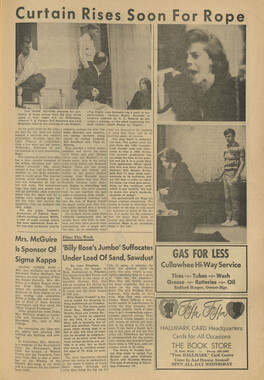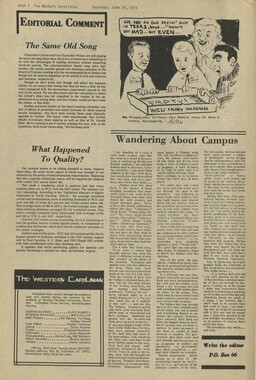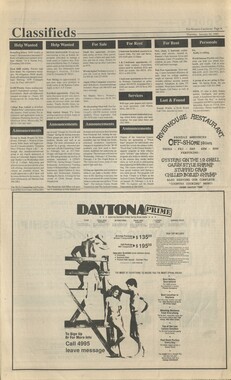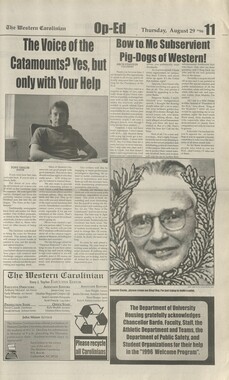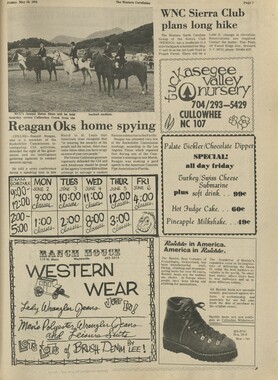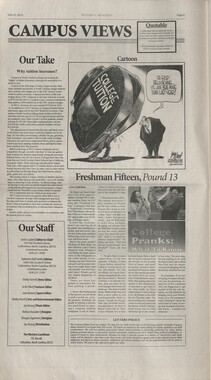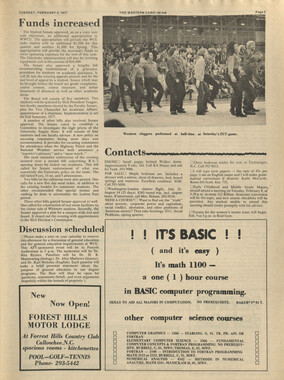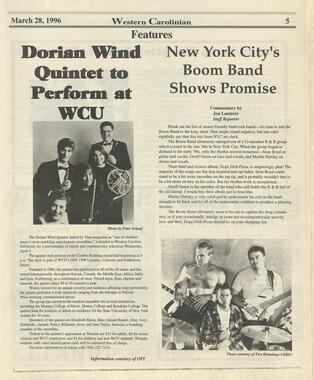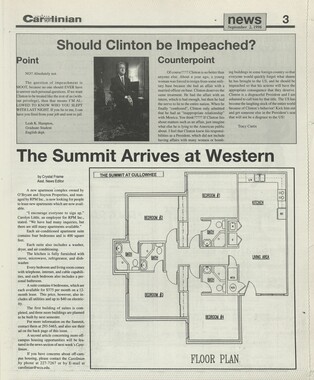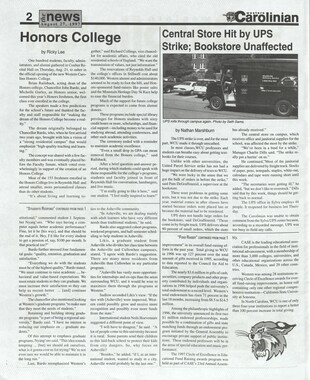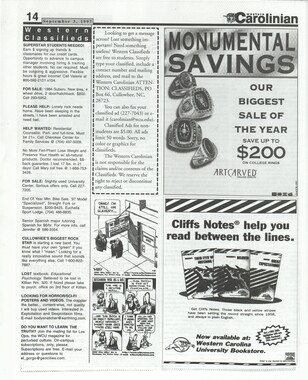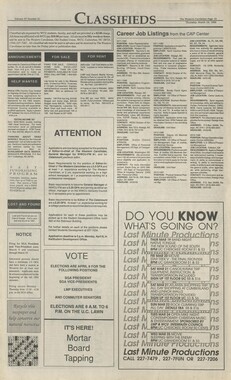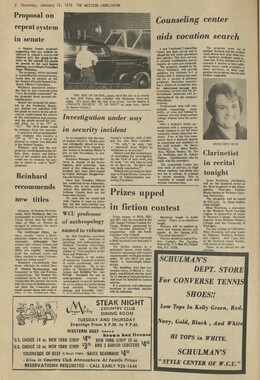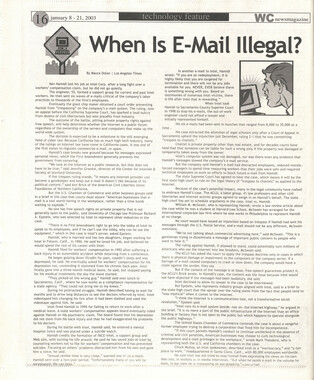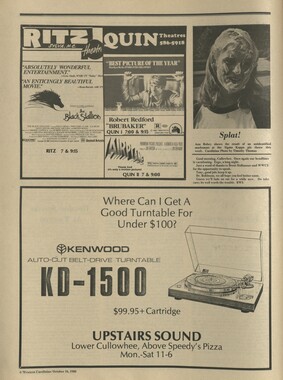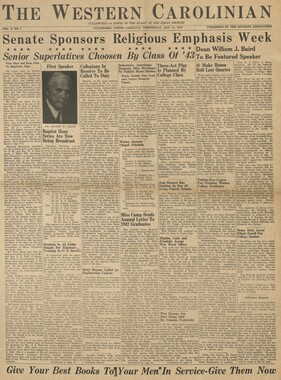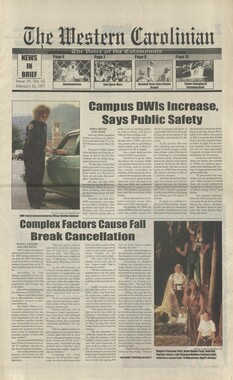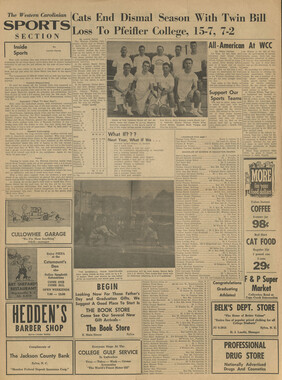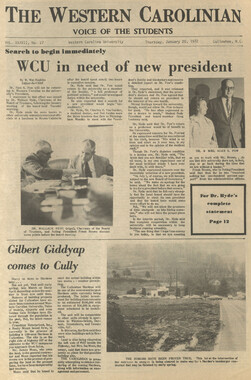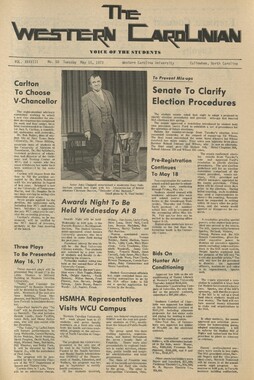Western Carolina University (21)
View all
- Canton Champion Fibre Company (2308)
- Cherokee Traditions (291)
- Civil War in Southern Appalachia (165)
- Craft Revival (1942)
- George Masa Collection (137)
- Great Smoky Mountains - A Park for America (3080)
- Highlights from Western Carolina University (422)
- Horace Kephart (973)
- Journeys Through Jackson (159)
- LGBTQIA+ Archive of Jackson County (89)
- Oral Histories of Western North Carolina (318)
- Picturing Appalachia (6617)
- Stories of Mountain Folk (413)
- Travel Western North Carolina (153)
- Western Carolina University Fine Art Museum Vitreograph Collection (129)
- Western Carolina University Herbarium (92)
- Western Carolina University: Making Memories (738)
- Western Carolina University Publications (2491)
- Western Carolina University Restricted Electronic Theses and Dissertations (146)
- Western North Carolina Regional Maps (71)
- World War II in Southern Appalachia (131)
University of North Carolina Asheville (6)
View all
- Allanstand Cottage Industries (62)
- Appalachian National Park Association (53)
- Bennett, Kelly, 1890-1974 (1463)
- Berry, Walter (76)
- Brasstown Carvers (40)
- Carver, George Washington, 1864?-1943 (26)
- Cathey, Joseph, 1803-1874 (1)
- Champion Fibre Company (233)
- Champion Paper and Fibre Company (297)
- Cherokee Indian Fair Association (16)
- Cherokee Language Program (22)
- Crowe, Amanda (40)
- Edmonston, Thomas Benton, 1842-1907 (7)
- Ensley, A. L. (Abraham Lincoln), 1865-1948 (275)
- Fromer, Irving Rhodes, 1913-1994 (70)
- George Butz (BFS 1907) (46)
- Goodrich, Frances Louisa (120)
- Grant, George Alexander, 1891-1964 (96)
- Heard, Marian Gladys (60)
- Kephart, Calvin, 1883-1969 (15)
- Kephart, Horace, 1862-1931 (313)
- Kephart, Laura, 1862-1954 (67)
- Laney, Gideon Thomas, 1889-1976 (439)
- Masa, George, 1881-1933 (61)
- McElhinney, William Julian, 1896-1953 (44)
- Niggli, Josephina, 1910-1983 (10)
- North Carolina Park Commission (105)
- Osborne, Kezia Stradley (9)
- Owens, Samuel Robert, 1918-1995 (11)
- Penland Weavers and Potters (36)
- Roberts, Vivienne (15)
- Roth, Albert, 1890-1974 (142)
- Schenck, Carl Alwin, 1868-1955 (1)
- Sherrill's Photography Studio (2565)
- Southern Highland Handicraft Guild (127)
- Southern Highlanders, Inc. (71)
- Stalcup, Jesse Bryson (46)
- Stearns, I. K. (213)
- Thompson, James Edward, 1880-1976 (226)
- United States. Indian Arts and Crafts Board (130)
- USFS (683)
- Vance, Zebulon Baird, 1830-1894 (1)
- Weaver, Zebulon, 1872-1948 (58)
- Western Carolina College (230)
- Western Carolina Teachers College (282)
- Western Carolina University (2008)
- Western Carolina University. Mountain Heritage Center (18)
- Whitman, Walt, 1819-1892 (10)
- Wilburn, Hiram Coleman, 1880-1967 (73)
- Williams, Isadora (3)
- Cain, Doreyl Ammons (0)
- Crittenden, Lorraine (0)
- Rhodes, Judy (0)
- Smith, Edward Clark (0)
- Appalachian Region, Southern (3032)
- Asheville (N.C.) (1945)
- Avery County (N.C.) (26)
- Blount County (Tenn.) (195)
- Buncombe County (N.C.) (1680)
- Cherokee County (N.C.) (283)
- Clay County (N.C.) (556)
- Graham County (N.C.) (238)
- Great Smoky Mountains National Park (N.C. and Tenn.) (525)
- Haywood County (N.C.) (3573)
- Henderson County (N.C.) (70)
- Jackson County (N.C.) (4925)
- Knox County (Tenn.) (35)
- Knoxville (Tenn.) (13)
- Lake Santeetlah (N.C.) (10)
- Macon County (N.C.) (421)
- Madison County (N.C.) (216)
- McDowell County (N.C.) (39)
- Mitchell County (N.C.) (135)
- Polk County (N.C.) (35)
- Qualla Boundary (982)
- Rutherford County (N.C.) (78)
- Swain County (N.C.) (2185)
- Transylvania County (N.C.) (270)
- Watauga County (N.C.) (12)
- Waynesville (N.C.) (86)
- Yancey County (N.C.) (72)
- Aerial Photographs (3)
- Aerial Views (60)
- Albums (books) (4)
- Articles (1)
- Artifacts (object Genre) (228)
- Bibliographies (1)
- Biography (general Genre) (2)
- Cards (information Artifacts) (38)
- Clippings (information Artifacts) (192)
- Copybooks (instructional Materials) (3)
- Crafts (art Genres) (622)
- Depictions (visual Works) (21)
- Design Drawings (1)
- Digital Moving Image Formats (2)
- Drawings (visual Works) (185)
- Envelopes (101)
- Exhibitions (events) (1)
- Facsimiles (reproductions) (1)
- Fiction (general Genre) (4)
- Financial Records (12)
- Fliers (printed Matter) (67)
- Glass Plate Negatives (381)
- Guidebooks (2)
- Internegatives (10)
- Interviews (823)
- Land Surveys (102)
- Letters (correspondence) (1045)
- Manuscripts (documents) (618)
- Maps (documents) (177)
- Memorandums (25)
- Minutes (administrative Records) (59)
- Negatives (photographs) (6090)
- Newsletters (1290)
- Newspapers (2)
- Notebooks (8)
- Occupation Currency (1)
- Paintings (visual Works) (1)
- Pen And Ink Drawings (1)
- Periodicals (194)
- Personal Narratives (10)
- Photographs (12977)
- Plans (maps) (1)
- Poetry (6)
- Portraits (4568)
- Postcards (329)
- Programs (documents) (181)
- Publications (documents) (2444)
- Questionnaires (65)
- Relief Prints (26)
- Sayings (literary Genre) (1)
- Scrapbooks (282)
- Sheet Music (2)
- Slides (photographs) (402)
- Songs (musical Compositions) (2)
- Sound Recordings (802)
- Specimens (92)
- Speeches (documents) (18)
- Tintypes (photographs) (8)
- Transcripts (329)
- Text Messages (0)
- A.L. Ensley Collection (275)
- Appalachian Industrial School Records (7)
- Appalachian National Park Association Records (336)
- Axley-Meroney Collection (2)
- Bayard Wootten Photograph Collection (20)
- Bethel Rural Community Organization Collection (7)
- Blumer Collection (5)
- C.W. Slagle Collection (20)
- Canton Area Historical Museum (2110)
- Carlos C. Campbell Collection (462)
- Cataloochee History Project (64)
- Cherokee Studies Collection (4)
- Daisy Dame Photograph Album (5)
- Daniel Boone VI Collection (1)
- Doris Ulmann Photograph Collection (112)
- Elizabeth H. Lasley Collection (1)
- Elizabeth Woolworth Szold Fleharty Collection (4)
- Frank Fry Collection (95)
- George Masa Collection (173)
- Gideon Laney Collection (452)
- Hazel Scarborough Collection (2)
- Hiram C. Wilburn Papers (28)
- Historic Photographs Collection (236)
- Horace Kephart Collection (861)
- Humbard Collection (33)
- Hunter and Weaver Families Collection (1)
- I. D. Blumenthal Collection (4)
- Isadora Williams Collection (4)
- Jesse Bryson Stalcup Collection (47)
- Jim Thompson Collection (224)
- John B. Battle Collection (7)
- John C. Campbell Folk School Records (80)
- John Parris Collection (6)
- Judaculla Rock project (2)
- Kelly Bennett Collection (1482)
- Love Family Papers (11)
- Major Wiley Parris Civil War Letters (3)
- Map Collection (12)
- McFee-Misemer Civil War Letters (34)
- Mountain Heritage Center Collection (4)
- Norburn - Robertson - Thomson Families Collection (44)
- Pauline Hood Collection (7)
- Pre-Guild Collection (2)
- Qualla Arts and Crafts Mutual Collection (12)
- R.A. Romanes Collection (681)
- Rosser H. Taylor Collection (1)
- Samuel Robert Owens Collection (94)
- Sara Madison Collection (144)
- Sherrill Studio Photo Collection (2558)
- Smoky Mountains Hiking Club Collection (616)
- Stories of Mountain Folk - Radio Programs (374)
- The Reporter, Western Carolina University (510)
- Venoy and Elizabeth Reed Collection (16)
- WCU Gender and Sexuality Oral History Project (36)
- WCU Mountain Heritage Center Oral Histories (25)
- WCU Oral History Collection - Mountain People, Mountain Lives (71)
- WCU Students Newspapers Collection (1923)
- Western North Carolina Tomorrow Black Oral History Project (69)
- William Williams Stringfield Collection (2)
- Zebulon Weaver Collection (109)
- African Americans (390)
- Appalachian Trail (35)
- Artisans (521)
- Cherokee art (84)
- Cherokee artists -- North Carolina (10)
- Cherokee language (21)
- Cherokee pottery (101)
- Cherokee women (208)
- Church buildings (190)
- Civilian Conservation Corps (U.S.) (111)
- College student newspapers and periodicals (2012)
- Dams (108)
- Dance (1023)
- Education (222)
- Floods (63)
- Folk music (1015)
- Forced removal, 1813-1903 (2)
- Forest conservation (220)
- Forests and forestry (1198)
- Gender nonconformity (4)
- Great Smoky Mountains National Park (N.C. and Tenn.) (181)
- Hunting (47)
- Landscape photography (25)
- Logging (122)
- Maps (83)
- Mines and mineral resources (9)
- North Carolina -- Maps (18)
- Paper industry (38)
- Postcards (255)
- Pottery (135)
- Railroad trains (72)
- Rural electrification -- North Carolina, Western (3)
- School integration -- Southern States (2)
- Segregation -- North Carolina, Western (5)
- Slavery (5)
- Sports (452)
- Storytelling (243)
- Waterfalls -- Great Smoky Mountains (N.C. and Tenn.) (66)
- Weaving -- Appalachian Region, Southern (280)
- Wood-carving -- Appalachian Region, Southern (328)
- World War, 1939-1945 (173)
Western Carolinian Volume 62 Number 05
Item
Item’s are ‘child’ level descriptions to ‘parent’ objects, (e.g. one page of a whole book).
-
-
4 Thursday, September 121996 Features Sllje Western Carolinian Variety of Bands Coming to WCU ANN WRIGHT FEATURES EDITOR Tickets go on sale this Friday the 13th for the first big concert to hit WCU this semester. Jars of Clay, the Samples, and Jump Little Children will all be coming to the Ramsey Center Friday, October 11. Jars of Clay is a contemporary Christian/alternative band out of Tennessee. They describe themselves as "an alternative to the alternative." Their current single, "Flood," is on the Hot 100 and their debut album, Jars of Clay, is number 60 on Billboard charts. Jars of Clay seek to be different. "I would like to think what we're doing here is unique," says guitarist Steve Mason. "I get frustrated with acts being 'the Christian equivalent' of anybody else, because I think that if it's of God, it can be better than anything the world has to offer." Coming together in 1993, Jars of Clay quickly rose to stardom in contemporary Christian music circles. They won the 1994 Gospel Music Association Spotlight Award. They won out over 200 other acts as the best unsigned band: Jars of Clay is composed of Dan Haseltine, lead vocals; Steve Mason, guitar, bass, background vocals; Matt Odmark, guitar, background vocals; and Charlie Lowell, organ, piano, background vocals. Lowell, Haseltine, and Mason met while attending Greenville College in Illinois. Odmark was a friend of Lowell's. The Samples, also appearing on October 11th, recently put out their MCA Records debut album, Outpost, and have sold over 500,000 records in the seven years they have been performing. They were featured performers at the first H.O.R.D.E. nationwide tour in 1992, and have opened for the Dave Matthews Band, Hootie and the Blowfish, and Toad the Wet Sprocket. The Samples started out in Boulder, Colo., and have developed a following that stretches over several states. They describe their music as "world beat influenced rock music." Though their albums have sold well, the true power of the band comes across in live shows. Jump Little Children will be the third band on the Friday night lineup. Ticket prices are $12.50 for WCU students, $14.50 for groups of ten or more, and $17.50 for all others. Tickets are available at the Ramsey Center, Radio Shack in Sylva, Music Box in Waynesville, and WCVP Radio in Murphy. For more information, please call 227-7211 or 227-7206. Retried Music to Eat from the Hampton Grease Band A Review of a local Band that Needs to lie Written Helping Others Learn to Read DAVE WILLIAMS STAFF WRITER About two years ago I was standing outside Bailey's with a couple of friends. We had just finished listening to Col. Bruce Hampton's new band, the Fiji Mariners, and were really impressed. Bruce was sitting outside with us, taking in the view of the parking lot, when I asked him about the Hampton Grease Band. He appeared somewhat baffled that someone my age would have known anything about his first band, which released their first and only album, Music To Eat, in 1971.1 told him that I was wondering if he had any idea when Columbia would get around to reissuing the album. He said he didn't know. I thanked him for playing and went home. Fast forward to July 1996.1 was at Almost Blue in Asheville when I looked up at the racks and there it sat. Needless to say, I was very happy that the good folks at Sony/Columbia/ Shotput had decided to re-release this on a low priced, two- disc set on the Legacy series. Here's why: Music To Eat is a milestone in the history of rock, southern or otherwise. For the uninitiated, the Hampton Grease Band was formed in 1968 in Atlanta, Ga., and featured Bruce Hampton (vocals, trumpet), Glenn Phillips (guitar, saxophone), Harold Kelling (guitar, vocals), Mike Holbrook (bass), and Jerry Fields (percussion, vocals). The first disc opens with the 19-minute "Halifax," which starts with a slow blues riff and Hampton's soulful vocals, then kickstarts into a shuffle. What follows is an encyclopedia of musical styles ranging from guitar duels (which remind one of the Allman Brothers or the Grateful Dead) to a Frank Zappaesque percussion section featuring guitar and glocken spiel. Also included is a section which vocally alludes to the B- 52's as well as some funky angular guitar playing that echoes both Captain Beefheart and James Brown. "Maria," which follows, is shorter and is as humorous as a Zappa piece with classical guitar flourishes courtesy of Phillips. "Six" and "Evans" finish up the disc with two long jams that head straight for the stratosphere, with some incredible playing from Phillips and Kelling. These two guitarists equal the power and imagination of such great guitarists as Dickey Betts and Duane Allman and Jerry Garcia and Bob Weir. The rhythm section of Holbrook and Fields makes sure that the music doesn't drag. The second disc features two shorter pieces. "Lawton" is an instrumental that recalls King Crimson (circa 1975) and John Cage, while "Hey Old Lady/ Bert's Song" is a short boogie- blues number. "Hendon," the last track, may very well be the best. Over 20 minutes long, it opens with Hampton singing the label from a can of spray paint. It then winds its way through a guitar section that wouldn't feel too out of place on a Henry Kaiser album (whom Phillips has worked with) before launching into one of the most awesome guitar duels ever recorded. Some say that Skynryd's "Free Bird" is the apex of southern-rock guitar. I say it's "Hendon." Listen and decide for yourself. Included with the two discs is a 24-page booklet featuring photos of the band, original artwork included on the vinyl release, and a very informative essay from Glenn Phillips which describes the hell they went through during the making of the album. Those who love the guitar jams of the Allman Brothers, the musical ferocity and virtuosity of Bruce Hampton's Aquarium Rescue Unit, or instrumental music in general, will find plenty to love on Music To Eat. This album offers proof that the Hampton Grease Band were not only of their time, but were also incredibly ahead of their time. ANN WRIGHT FEATURES EDITOR People complain that western North Carolina is in awful shape. Poverty, disease, joblessness, abuse, illiteracy, and a host of other evils plague the area. The worst dilemma we suffer from, though, is apathy. Sure, these problems can't be cured easily, but the average person can do something to help. For instance, your typical college student can give other people a skill which will enable them to get a job, write a grocery list, pay monthly bills, and read to their children. This amazing ability is one that you and I take for granted every day: the ability to read. In the early part of the decade, the Employment Security Commission (ESC) found that 33.9 percent of statewide jobs were blue-collar, requiring skills that can be learned on the job. However, the ESC estimates that only 7.3 percent of the net new jobs created in North Carolina from 1991 to 2010 will be in blue-collar trades. What impact does this have on western North Carolina? "The changes mean that the days of walking out the high school door (with or without a diploma) and into a lifelong job on the plant floor are over," indicates Western North Carolina's Choice: Higher Skills or a Bleak Future, a report published by the Western Carolina Economic Competitiveness Campaign. The report examines the skills of the region's workers. Furthermore, the jobs being created in western North Carolina can fall anywhere on the pay scale. "The difference in the service sector is that in order to get a good job, you've got to have skills," states Higher Skills. Computers are no longer the way of the future—they are already here. Most decent paying jobs require some amount of basic computer knowledge (if not training in specific programs). However, how can someone run a computer who cannot even read its instruction manual? The bad news continues: 13.1 percent of the residents of the 17 mountain counties have incomes below the poverty line. In fact, the median family income in this region is $5,000 less per year than the state median, which is far below the national average. The United States Department of Education released the National Adult Literacy Survey (NALS) which documents a correlation between poverty and low literacy skills. Survey respondents scoring within the two lowest levels of literacy skills were more apt to have lower weekly salaries and fewer annual weeks of employment than those scoring in the top literacy levels. Data from the Governor's Commission on Workforce Preparedness (GCWP) estimates that "between 18 and 20 percent of North Carolina's adults are in serious need of literacy services and an additional 31-33 percent have some need." GCWP goes on to write that in North Carolina, "literacy services are provided through 58 community colleges and over 45 volunteer/community based organizations." GCWP admits that these combined agencies only served a little over ten percent of the adults in most serious need of literacy services geared towards adults. But what can we as college students do to change things? We can start by giving something that doesn't cost money or require us to give up too much of our time. Helping someone lean, to read only takes an hour or two a week and a minimal amount of training. Literacy councils exist in most counties and information on them can usually be obtained through your public library. Macon County Literacy Council, located on 1000 Wayah Road in Franklin, is the closest literacy council to WCU. Its president, Helen Feyfert, is eager for new tutors as well as vol unteers who can help out around the office. Macon County Literacy Council aids adults, children, and people from foreign countries who need to increase their English skills. In the past, several WCU students have received training and volunteered as tutors at the neighboring Haywood County Literacy Council (HCLC) in Waynesville. HCLC is a nonprofit United Way agency with its headquarters on the bottom floor of the Waynesville Public Library. You won't find any highly paid bureaucrats there. The office is staffed by two full- time employees: Executive Director, Nan Loyer (who helped found the organization in the early '80s), and an office manager, Harriet Retterer. A part- time Volunteer In Service To America (VISTA), Donna Forga, also works in the office. In addition to offering free, one-to-one tutoring to adults, literacy councils also work with children who are more than a grade behind in their schoolwork and with people who want to learn to speak English. In short, tutors can pick the age group they feel most comfortable with and can even work with people from foreign countries. Knowledge of any language other than English is not required. Training to become a tutor is fairly simple. Would-be tutors must participate in a one-day tutoring workshop. A one-time fee of $10 covers all workshop materials and is the only expense required by the literacy council. After the training workshop, tutors are matched with compatible students as quickly as possible. If you are interested in tutoring or would like to learn more about adult illiteracy or English as a Second Language, please call the Macon County Literacy Council at (704) 369- 6983 or (704) 524-6837 and the Haywood County Literacy Council at (704) 452-1695.
Object
Object’s are ‘parent’ level descriptions to ‘children’ items, (e.g. a book with pages).
-
The Western Carolinian is Western Carolina University's student-run newspaper. The paper was published as the Cullowhee Yodel from 1924 to 1931 before changing its name to The Western Carolinian in 1933.
-
